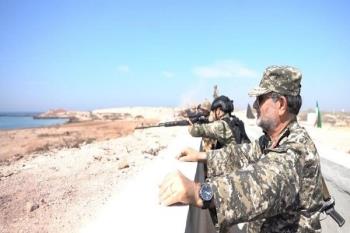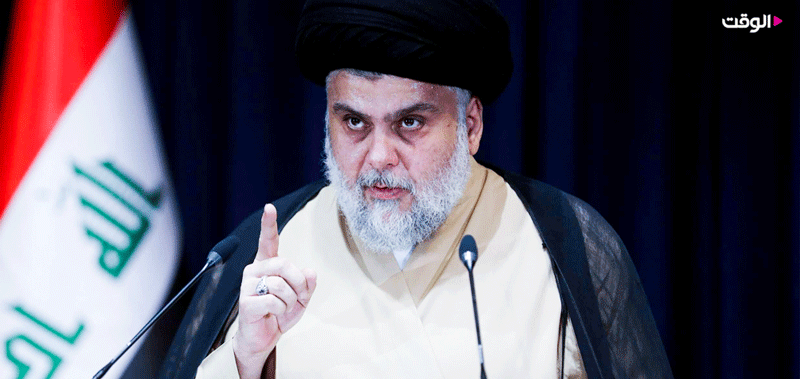Alwaght- The National Salvation Coalition that includes Sadrist Movement, Kurdistan Democratic Party, and the Sunni Sovereignty bloc and was formed on March 23 seems to have admitted its failure to form a new cabinet way sooner than expected.
Following the failure of the coalition to reach the quorum of the parliament on March 23 and 30 sessions, Muqtada al-Sadr, the leader of the Sadr Movement, in a Twitter message said that because of critical security, economic, and public services conditions the opposition that boycotted the parliamentary sessions are given 40 days from the first day of the holy month of Ramadan (April 3) to May 10 to consult for a majority bloc in order to form a new government without the Sadrist Movement. He also called his fellow party members not to enter the issue either positively or negatively.
Here is a question: What scenarios does al-Sadr's deadline to Shiite Coordination Framework (SCF) bring to the Iraqi politics and governance?
Six scenarios are possible.
National majority government more unreachable than before
Despite al-Sadr's 40-day deadline to the SCF, which he called "one-third minority" in parliament, the scenario of forming a national majority government through al-Sadr's coalition with Kurds and Sunnis remains possible. Al-Sadr has strongly supported the formation of a "national majority" government in all the days since the announcement of the results of the October 10, 2021 elections, and has so far not backed down from his initial positions to form a majority government. Even in his deadline statement, he boasts of being the first Iraqi to form a national majority coalition and name an acceptable figure to the list of the prime minister.
After the suspension of the last two sessions of the parliament due to failure to meet the official session threshold (two thirds of the representatives are required for an official session), it became clear to what extent al-Sadr has been wrong in his analysis and assessment of the situation. This scenario of national majority cabinet is practically on the verge of complete collapse as the SCF absence drops from officiality the parliament sessions, and it is possible to succeed only in the event of a major turnaround of the Patriotic Union of Kurdistan (PUK) or another party within the Shiite framework. Indeed, such a possibility seems highly unreachable.
SCF cabinet formation, a substantially difficult path
Another possible scenario is the formation of a new government by the SCF driven by al-Sadr deadline. In such a case, ex-PM Nouri al-Maliki would hold the post again, and the Shiite-backed figure for the presidency, the current present Barham Saleh, will retain the post. A necessary and sufficient condition for the realization of such a scenario is a deal of Sovereignty bloc led by former parliament speaker Mohammad al-Halbousi and Sunni businessman Khamis Khanjar and the KDP led by Massoud Barzani with the SCF.
Under this scenario, an agreement with the Shiite coalition would give birth to a new government after months, with the Sadrist Movement shifting to opposition role. This scenario is, however, excessively optimistic because reaching a 220-seat threshold for the SCF that is required to form a majority bloc is, to a large extent, impossible given the current circumstances and the alliances formed among political parties.
Returning to the traditional national unity government, rational but…
Undoubtedly, the most appropriate and logical scenario for the future of the formation of the government in Iraq is a return to the traditional formula of national unity government with the participation of all political blocs. Despite the availability of this scenario and its rationality, the scale of tension and rivalry between al-Sadr and SCF has moved so high that it is so difficult to achieve such a scenario. Still, this scenario is the most likely one should the current situation prevail.
Continuation of legal and political suspension
The recent parliament session suspensions revealed the fact that the conditions for a new government are way tougher that al-Sadr and his allies expected. Basically, the election of a new president will be the second stage in the formation of a new government after the election of the speaker of parliament. Because according to Article 76 of the Iraqi constitution, the new president has to nominate the candidate of the majority faction within 15 days. This means that al-Sadr coalition has to first install its president candidate, Rebar Ahmad Khaled of KDP, and then move to conclude PM choice and government formation.
The new session of parliament on March 26, however, showed that it would be very difficult to convene 220 lawmakers for the session to elect a new president. Such a situation, with al-Sadr's insistence on monopolization of the formation of the cabinet, will essentially bring the political process to a broad legal vacuum. Because, on the one hand, the presence of two-thirds or 220 lawmakers is necessary, and on the other hand, both rival factions have the ability to deactivate the parliamentary session to elect a new president by their absence. If a new president is not elected, it will be virtually impossible to pick a new PM and form a new cabinet, which would mean Iraq entering a period of political stalemate with potentially major consequences.
Win-win formula: Sadrist-led government under a parliament with strong opposition
Another probable scenario helping exit the current situation in Iraq is a reference to the initiative presented by independent bloc Ishraqa Kanon, which suggests that al-Sadr-led coalition would be given full freedom of action to form a government, and in return the SCF as opposition in parliament is given a leeway to chair most of the parliamentary commissions. The key point of this initiative is that the opposition is enabled to perform its duty of monitoring and holding the government accountable in the parliament, and in return, the al-Sadr-led government must respond for possible weakness and incompetence.
Hadi al-Amiri, the head of Fatah bloc, as a member of SCF, at a meeting on March 31 explicitly welcomed the proposal.
"It is impossible that a bloc monopolizes all the parliamentary and administrative posts and expect the opposition to perform its duty of supervising the government work," al-Amiri told the meeting.
For the SCF, this is a win-win formula. However, this initiative is unlikely to meet materialization despite being rational because al-Sadr is not inclined to enter a game in which a government led by his movement shoulders all responsibility.
Holding early election: a choice won't do much to solve the problems
Snap elections is another choice for Iraq to step out of the current limbo. This scenario is, however, strongly opposed to by al-Sadr and his Kurdish and Sunni allies. But under continued political suspension this choice can be entertained. In a recent article, the head of the Supreme Judicial Faiq Zaidan reminded of the need for adherence to legal timing for president election and government formation. Acting like a sword of Damocles, the Supreme Judicial Court maintains over the head of the political factions the threat of dissolution of the parliament and announcement of early elections as a bitter choice to exit the current dead end if they continue to fail to agree on a solution. Though this scenario is of high likelihood and the Shiite framework is keen to see it happening, it essentially does not provide a solution to the present quandary because the suspension is an accessible choice to the rival factions, meaning the crisis will continue to unfold in the country.



























